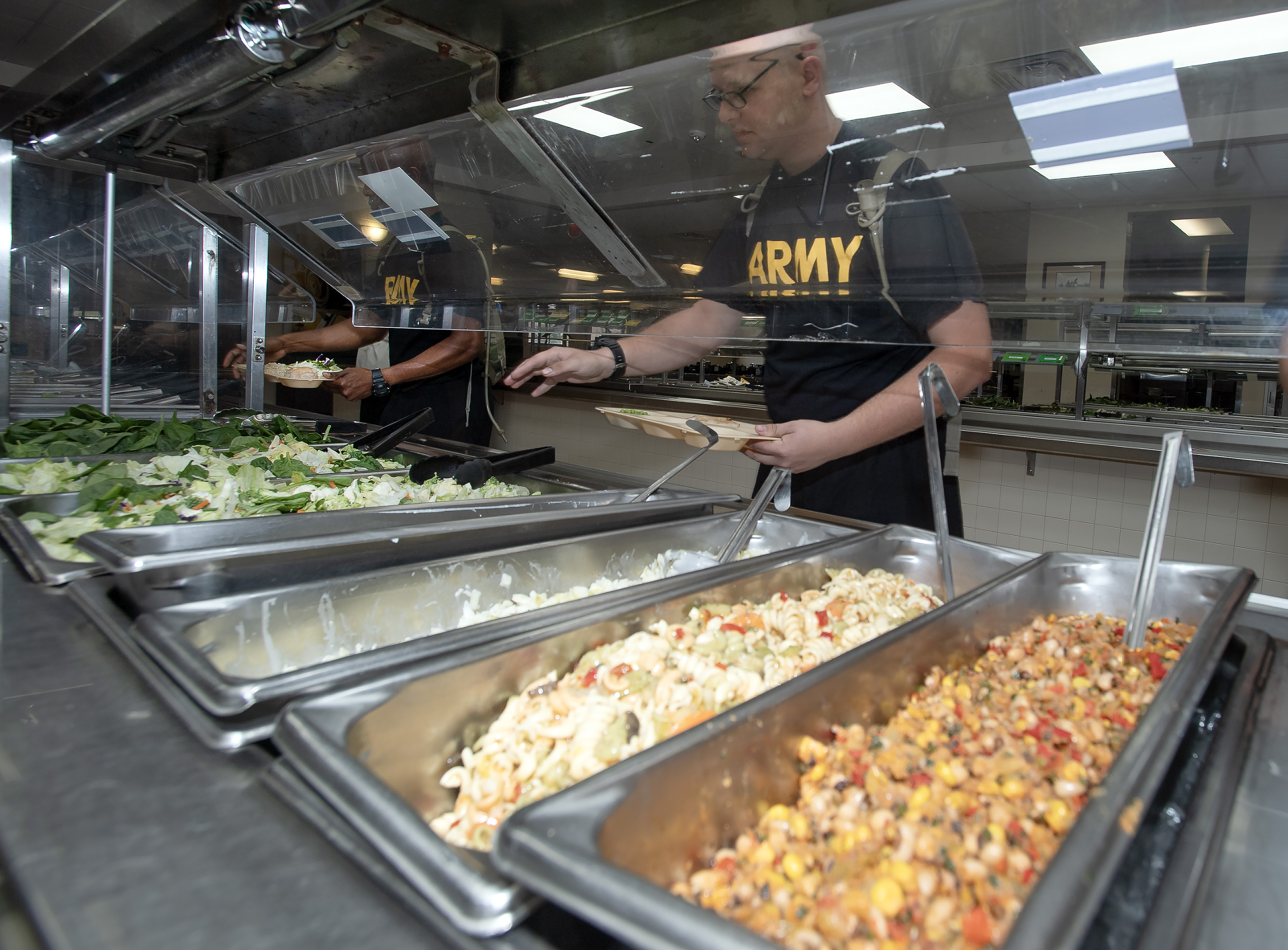
Trainees in the Future Soldier Preparatory Course with 1st Battalion, 61st Infantry Regiment, reach for salads during lunch, Aug. 29, 2023. Food items in the dining facility are color-coded to help Soldiers choose the items healthiest for them. (Photo by Robert Timmons)
Reaching for Greens: Prep course reaches milestone
By Emily Hileman, Fort Jackson Public Affairs
August 8 marked one year of the Future Soldier Preparatory Course, an innovative solution to the recruiting crisis. On Aug. 28-29 Fort Jackson opened its doors and gave an update on the program’s status.
“The Future Soldier Prep Course is where desire meets investment,” said Brig. Gen. Jason E. Kelly, Fort Jackson commander. “And every day these young men and women show that when provided the right resources and training, they are able to perform and meet or exceed the standards expected of every Soldier.”
The FSPC is divided into two programs or tracks.
The academic track takes trainees scoring 21 or above on the Armed Services Vocational Aptitude Battery, or ASVAB, and works to develop and improve their word knowledge, reading comprehension, arithmetic, reasoning and test-taking skills.
Trainees re-test every three weeks and have up to 90 days to increase their score. Once they improve their score to an appropriate number, they are able to renegotiate their Military Occupational Specialty or MOS, contract and even sign-on bonuses.
Pvt. Yasmin Diaz, an academic track trainee struggled with word knowledge when she first attempted the ASVAB.
“In high school, you don’t really focus on the words, you’re just trying to write essays,” she said. “So, when I went to take the ASVAB, it was mainly focused on knowing the words and synonyms and they didn’t really teach us that (in high school).”
Diaz is hoping to renegotiate her MOS and serve in the National Guard in her hometown so she can give back to her mother, a single mother who raised Diaz and her three siblings.
Participants in the academic track have seen an average ASVAB score increase of 18.5%.
The fitness program accepts recruits that are between two and six percent over the allowable body fat composition to join. These trainees work with several members of the Fort Jackson Holistic Health and Fitness team as well as their cadre to ensure weight loss.
“We prioritize the holistic health and fitness approach here,” said Capt. Emily Rice, Alpha Co. 1st Battalion, 61st Infantry Regiment commander. “So, sleep is very important, and our physical training plan is well-programed so that the trainees are not overtraining any one system.”
“If you improve their diet and their activity level, they’re going to lose weight,” she said. “A piece that we often forget about is the importance of regulating circadian rhythms, which reduces cortisol and causes weight loss.”
Rice, a registered dietician by trade said she worked with physical and occupational therapists at the Fort Jackson H2F center to program a curriculum that would not overexert the trainees. They also monitor the trainees to ensure they don’t lose an unhealthy amount of weight in a short period of time.
Participants in the fitness track have lost an average of 1.7% body fat per week.
The FSPC has seen an overwhelming level of success with more than 10,000 Soldiers successfully passing on to Basic Combat Training, giving the program a 95% graduation rate.
Twenty-three % of available awards in Basic Combat Training are earned by Future Soldier Prep Course graduates and more than 15% have scored 500 or above on the Army Combat Fitness Test, where the maximum score is 600.
The potential of these dedicated and driven Soldiers is not lost on Kelly.
“If one wants to serve, we have a way to fight through the individual obstacles that may have prevented their service in the past.”





